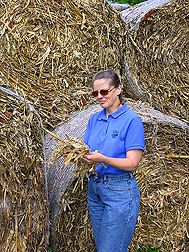This page has been archived and is being provided for reference purposes only. The page is no longer being updated, and therefore, links on the page may be invalid.
Read the magazine story to find out more. |
|
Farmers Have Antidotes to Oil Dependency
By Don ComisAugust 24, 2006
Developing ways to use crops and manure to displace petroleum-based fuels is the goal of Agricultural Research Service (ARS) scientists in the Renewable Energy and Manure Management Research Unit in Bushland, Texas.
In addition to studies there, the search for alternative fuels extends across the country, including places like the ARS North Central Soil Conservation Laboratory in Morris, Minn.
Nolan Clark, research leader at the Bushland unit, and colleagues plan to test various biodiesel fuels. Their idea is that locally available materials, such as palm oil in Hawaii, are most economical to use. Inspired by Clark’s presentation on biodiesel, one Arctic village uses fish oil biodiesel to fuel generators that provide the town’s electricity.
The Texas scientists are also working with the Texas Agricultural Experiment Station in Amarillo on burning a manure-coal mix to heat buildings and to provide heat needed to produce ethanol. This is one of many possible alternative fuels being considered to cut costs in manufacturing ethanol.
They’re also researching potential uses for the manure-coal ash left after burning, such as for fertilizer or horticultural bedding material.
Abdullah Jaradat, research leader at the Morris lab, and colleagues are cooperating with the University of Minnesota at Morris to test the gasification of cornstalks, wood and other materials to heat and cool university buildings. They are analyzing the ash to see whether it is safe to use as fertilizer.
Gasification is a burning technique that turns cornstalks and other materials and their smoke into a gas that can be used for cooking or heating. The gas can also be converted into electricity and could even fuel vehicles in an extended petroleum shortage.
The Minnesota scientists are also researching whether hydrogen or a Cuphea-based biofuel might fuel the university's back-up generators. Cuphea is a genus of herbaceous annual plants that grow throughout the Western Hemisphere. Cuphea plants yield a unique seed oil that potentially could be used as biofuel without the chemical modification required of soybean oil. This also has potential for use as an industrial lubricant, displacing imported oil.
Read more about the research in the August 2006 issue of Agricultural Research magazine.
ARS is the U.S. Department of Agriculture’s chief scientific research agency.

